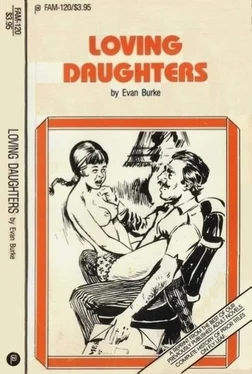Evan Burke - Loving daughters
Здесь есть возможность читать онлайн «Evan Burke - Loving daughters» весь текст электронной книги совершенно бесплатно (целиком полную версию без сокращений). В некоторых случаях можно слушать аудио, скачать через торрент в формате fb2 и присутствует краткое содержание. Жанр: Эротика, Секс, на английском языке. Описание произведения, (предисловие) а так же отзывы посетителей доступны на портале библиотеки ЛибКат.
- Название:Loving daughters
- Автор:
- Жанр:
- Год:неизвестен
- ISBN:нет данных
- Рейтинг книги:4 / 5. Голосов: 1
-
Избранное:Добавить в избранное
- Отзывы:
-
Ваша оценка:
- 80
- 1
- 2
- 3
- 4
- 5
Loving daughters: краткое содержание, описание и аннотация
Предлагаем к чтению аннотацию, описание, краткое содержание или предисловие (зависит от того, что написал сам автор книги «Loving daughters»). Если вы не нашли необходимую информацию о книге — напишите в комментариях, мы постараемся отыскать её.
Loving daughters — читать онлайн бесплатно полную книгу (весь текст) целиком
Ниже представлен текст книги, разбитый по страницам. Система сохранения места последней прочитанной страницы, позволяет с удобством читать онлайн бесплатно книгу «Loving daughters», без необходимости каждый раз заново искать на чём Вы остановились. Поставьте закладку, и сможете в любой момент перейти на страницу, на которой закончили чтение.
Интервал:
Закладка:
I had made a wise decision. Daddy would need someone when I was gone. Terri would be that someone. She would love him, as I had done. She would care for him, as I had done. She would fuck him, as I had done. A wise decision. One I was sure I would never regret.
Incest. A word that will cause a feeling of the deepest revulsion in many of those who hear it spoken; a word that will be misunderstood, or inadequately understood, by even more.
Incest. Perhaps the most deeply entrenched taboo in Western society. Forbidden by moral codes, forbidden by most religious customs, and in certain circumstances where it is not forbidden by law, it is at least discouraged. It is, surely, our strongest sexual taboo.
During the last two decades we have seen the stigma that was once associated with other "different" forms of sex begin to lessen. When, around 1955, the subculture of mate-swapping began to surface, it caused quite a furor. Many tried to write it off as a passing fad, and those who engaged in swapping were widely condemned. Today, though society has by no means given its approval of the practice, it has recognized that swapping is the personal business of those who engage in it, and that society has neither the need nor the means to control it. The taboo has not completely vanished — but much of the stigma has faded.
Oral sex — such as cunnilingus and fellatio — was once considered by many to be the most perverted of sexual acts. It was condemned as "unnatural" and was illegal in many states — even when practiced by a man and his wife, in the privacy of their own bedroom. While this act remains forbidden by statute in some states, such laws are rarely enforced — except in cases where minors are involved — and oral sex is seen in a new and much brighter light.
Anal intercourse is known to be used by a great number of couples, and the mention of this act no longer creates the revulsion that it once did. If not completely toppled, another taboo has at least been weakened.
Homosexuals, both male and female, have gained a new acceptance. Without putting it in writing, without changing the statutes that have discouraged and suppressed acts of homosexuality, society has finally conceded to these people their right to behave as they choose so long as their acts do not infringe upon the rights of others.
Yes, most of the taboos have faded away into limbo; and others are faltering. This is due in large part to the great advances made in psychosexual knowledge during recent years; due to studies such as the Kinsey reports, which showed such acts to be much more widespread than had previously been thought. It was information obtained from such studies that created a new atmosphere in which such acts are seen as small parts of the sexual scene rather than the "sick" acts of a "perverted" mind.
But what about incest?
Incest, of course, refers to sexual relations between members of the same family — between brother and sister, between mother and son, between father and daughter. The relationship may be homosexual such as a lesbian experiment between two sisters: or it may be troilistic (troilism is sex involving three partners) such as the case described by Brenda at the opening of this book. Still, it is incest.
The actual sex act may be oral, it may be anal, or it may be ordinary copulation; but, if it involves two members of the same family, it is incest.
And it is the one taboo on which Western society has refused to yield. There is little evidence to indicate that it will.
Much of the rationale upon which society bases its condemnation of the incestuous relationship springs, of course, from genetic and biological factors. There is certain evidence that pregnancies which result from intercourse between closely related couples show a high incidence of genetic complications in the offspring — deformed or mentally retarded children. This is the basis of the laws by which many of our states forbid marriages between close relatives, such as first cousins.
A much larger portion of the arguments against incest, however, are based on custom. There was a time when it was the duty of a daughter — nearly her sole duty — to bring a husband into the household, thus expanding the size, the wealth, and the strength of the family. Virginity was highly prized, especially during the Victorian era, and a girl was expected to remain a virgin until marriage. For this reason, all contacts with male members within the family structure were closely supervised, rigid separation of the sexes was imposed. Even the most innocent of contacts between brother and sister, for instance, were condemned and punished, and the child was guided outward — to expand and strengthen the family. To err was to live forever in guilt.
Edward M. Brecher, in his book The Sex Researchers, reports that Henry Havelock Ellis, one of the first and most famous of those who have explored the intricate world of sex, had his first sexual experience with a young cousin' who came to visit. Though the event is described as very mild and timid, young Ellis, raised in the strict Victorian era of the mid-1800s, seems to have borne the memory to his grave.
For years, the book reports, Ellis was totally incapable of enjoying sexual intercourse, never achieving ejaculation until he was well into his thirties. Then, when finally he chose to marry, Ellis chose a lesbian to be his bride. He knew of her lesbianism, and is said to have accepted it. Anna, his wife, brought her conquests into their home.
It was only after the death of his wife, the author reports, that Ellis was able to achieve full sexual gratification — and he found it with a former mistress of his deceased wife. Brecher attributes much of the sexual problems of Havelock Ellis to the lingering guilt in his mind — guilt brought on by an affair so mild that it would go unnoticed today.
So it is that society enforces its customs.
But this work will not concern itself with the milder forms of incest — the innocent kissing and fondling of children — and it will not attempt to explore the full spectrum of such relationships… It will, instead, focus on one aspect of the subject. Daughters and fathers.
In these pages you are going to meet daughters and fathers who obey no rules but their own, daughters and fathers who choose to violate the moral codes imposed by our culture, and you are going to hear, in their own words, with no apologies, why and how they do so.
You are going to meet the people who have passed the barrier against incest, the barrier that Freud described in the following manner:
… Respect for this barrier is essentially a cultural demand made by society. Society must defend itself against the danger that the interests which it needs for the establishment of higher social units may be swallowed up by the family; and for this reason, in the case of every individual, it seeks by all possible means to loosen their connection with their family — a connection which, in their childhood, is the only important one.
… The parents' affection far the child may awaken his sexual instincts prematurely to such a degree that the mental excitation breaks through in an unmistakable fashion to the genital system. If, on the other hand, the parent is able to postpone this excitation until later, the affection can perform its task of directing the child in his choice of a sexual object when he reaches maturity.
… Time has been gained in which the child can erect, among other things, the barrier against incest, and can thus take up into himself the moral precepts which expressly exclude from his object-choice, as being blood-relations, the persons whom he has loved in his childhood.
"The barrier against incest," Freud continues, "is probably among the historical acquisitions of mankind, and, like other moral taboos, has no doubt already become established in some persons by organic inheritance. Psycho-analytic investigation shows, however, haw intensely the individual struggles with the temptation to incest during his period of growth and haw frequently the barrier is transgressed in fantasies and even in reality." While many researchers dispute Freud's theory of organic inheritance of the "barrier against incest", most will agree that the barrier is frequently transgressed "in fantasies and even in reality".
Читать дальшеИнтервал:
Закладка:
Похожие книги на «Loving daughters»
Представляем Вашему вниманию похожие книги на «Loving daughters» списком для выбора. Мы отобрали схожую по названию и смыслу литературу в надежде предоставить читателям больше вариантов отыскать новые, интересные, ещё непрочитанные произведения.
Обсуждение, отзывы о книге «Loving daughters» и просто собственные мнения читателей. Оставьте ваши комментарии, напишите, что Вы думаете о произведении, его смысле или главных героях. Укажите что конкретно понравилось, а что нет, и почему Вы так считаете.












